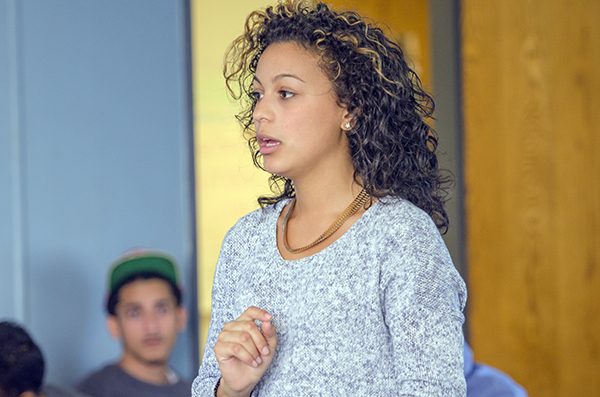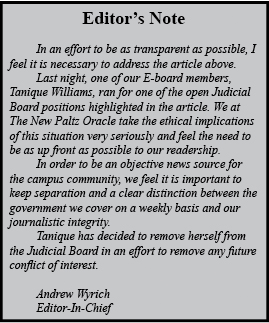

During the semester, the 54th student senate underwent a tedious process to elect members to the school’s Judicial Board.
Director of Student Activities and Union Services Mike Patterson said the Judicial Board is a hearing committee held out of the Dean of Students’ Office. It is made up of students, faculty and administrators who hear cases on violations of the Student Code of Conduct.
After the three students introduced themselves and stated to Senate why they think they would be good candidates for the position, senators asked the nominees questions.
During this period, the three candidates were asked questions, which Patterson said they “should not have been asked.”
Senate asked the candidates to step out of the room and motioned for discussion before voting took place.
An area of concern was that word about the elections did not reach a variety of students and that because of the lack of diversity among the candidates, there would be judicial biases if the candidates were elected.
Senate Chair Yaritza Diaz said the senate’s main concern was addressing the issues of the student body.
“They were worried that having a small group of people with similar backgrounds regarding their involvement on this campus was not enough to represent the student body as a whole,” she said.
A motion was put in place to table the election for another week so additional students could be brought in.
“It is not uncommon for the Senate to table nominations for various student representative seats,” Patterson said. “The general concern of wanting to see broader student representation is a valid concern.”
Sen. Richard Jean-Louis acknowledged that diversity among candidates is one of the most
significant criteria of the senate’s selection process.
“It ensures that different views, ideas and perspectives are present when making important decision,” Jean-Louis said. “Judicial hearings determine life-changing moments of students and they should be handled by a diverse committee with great acumen.”
Throughout the week, the three candidates met with Diaz and expressed their discontent with their senate experience. According to Student Association (SA) President Josh
Simpson, all three candidates “decided they weren’t interested after their experiences.”
During the second meeting of the student senate, Simpson informed senators that no students had come to his office conveying interest in the Judicial Board. He asked senators to spread the word and send students his way.
Patterson said it is imperative that these seats are filled.
“Students that have hearings as a result of violations of the student code of conduct deserve and should have a timely judicial process,” Patterson said. “Without students available to be selected for specific hearing, the hearings get delayed.”
On Tuesday, Oct. 2, during the student senate’s fourth meeting of the semester, two interested candidates ran for the Judicial Board election.
Four weeks after the original elections, two students were voted onto the Judicial Board and there are two seats currently remaining.
Facing criticism for the events surrounding the first election of the Judicial Board, Diaz spoke to the senators regarding future situations.
“If we ever have a concern that might be personal, we should discuss that through the discussion, not during the question time,” Diaz said.
Considering it is relatively early in the semester, the senate has time to rectify their mistakes, Patterson said. He said the senate has the opportunity to learn, but only time will tell because they are new in their roles and are learning as they go.
In regard to preventing similar incidents, Diaz said she takes some of the responsibility.
“As senate chair I should have guided [the senators] toward making better decisions from the start,” Diaz said. “This is also a reflection on me and it is something that we will work on in the future.”
Jean-Louis said senate should use this incident as a learning experience.
“We can use [this experience] to improve transparency and communication amongst our peers when reaching out for certain positions and openings,” Jean-Louis said. “I think the new senators can observe how intense and important our job is.”

